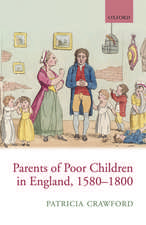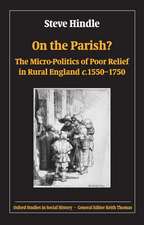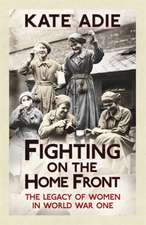The Bourgeois Citizen in Nineteenth-Century France: Gender, Sociability, and the Uses of Emulation: Oxford Historical Monographs
Autor Carol E. Harrisonen Limba Engleză Hardback – iul 1999
Din seria Oxford Historical Monographs
- 19%
 Preț: 497.26 lei
Preț: 497.26 lei - 12%
 Preț: 310.34 lei
Preț: 310.34 lei - 30%
 Preț: 539.99 lei
Preț: 539.99 lei - 15%
 Preț: 244.01 lei
Preț: 244.01 lei - 13%
 Preț: 532.53 lei
Preț: 532.53 lei - 30%
 Preț: 499.46 lei
Preț: 499.46 lei - 30%
 Preț: 497.67 lei
Preț: 497.67 lei - 30%
 Preț: 499.18 lei
Preț: 499.18 lei - 30%
 Preț: 498.68 lei
Preț: 498.68 lei - 30%
 Preț: 604.98 lei
Preț: 604.98 lei - 30%
 Preț: 497.63 lei
Preț: 497.63 lei - 24%
 Preț: 496.31 lei
Preț: 496.31 lei - 30%
 Preț: 498.68 lei
Preț: 498.68 lei - 22%
 Preț: 497.81 lei
Preț: 497.81 lei - 25%
 Preț: 556.27 lei
Preț: 556.27 lei - 14%
 Preț: 539.57 lei
Preț: 539.57 lei - 30%
 Preț: 500.29 lei
Preț: 500.29 lei - 13%
 Preț: 533.57 lei
Preț: 533.57 lei - 25%
 Preț: 569.72 lei
Preț: 569.72 lei - 30%
 Preț: 610.82 lei
Preț: 610.82 lei - 34%
 Preț: 1153.34 lei
Preț: 1153.34 lei - 51%
 Preț: 614.88 lei
Preț: 614.88 lei - 34%
 Preț: 1195.31 lei
Preț: 1195.31 lei - 34%
 Preț: 1035.84 lei
Preț: 1035.84 lei - 34%
 Preț: 1006.40 lei
Preț: 1006.40 lei - 29%
 Preț: 864.39 lei
Preț: 864.39 lei - 34%
 Preț: 1160.09 lei
Preț: 1160.09 lei - 34%
 Preț: 1432.67 lei
Preț: 1432.67 lei - 31%
 Preț: 328.46 lei
Preț: 328.46 lei - 34%
 Preț: 574.40 lei
Preț: 574.40 lei - 34%
 Preț: 1067.93 lei
Preț: 1067.93 lei - 34%
 Preț: 1004.62 lei
Preț: 1004.62 lei - 31%
 Preț: 331.22 lei
Preț: 331.22 lei - 34%
 Preț: 1153.28 lei
Preț: 1153.28 lei - 34%
 Preț: 1254.66 lei
Preț: 1254.66 lei - 34%
 Preț: 946.79 lei
Preț: 946.79 lei - 34%
 Preț: 962.63 lei
Preț: 962.63 lei - 34%
 Preț: 1126.38 lei
Preț: 1126.38 lei - 31%
 Preț: 469.27 lei
Preț: 469.27 lei - 23%
 Preț: 332.04 lei
Preț: 332.04 lei - 28%
 Preț: 375.23 lei
Preț: 375.23 lei - 34%
 Preț: 1049.14 lei
Preț: 1049.14 lei - 34%
 Preț: 1036.73 lei
Preț: 1036.73 lei - 51%
 Preț: 757.67 lei
Preț: 757.67 lei - 34%
 Preț: 1082.61 lei
Preț: 1082.61 lei - 34%
 Preț: 1155.39 lei
Preț: 1155.39 lei - 31%
 Preț: 328.53 lei
Preț: 328.53 lei - 34%
 Preț: 1110.12 lei
Preț: 1110.12 lei - 31%
 Preț: 487.75 lei
Preț: 487.75 lei - 34%
 Preț: 1153.41 lei
Preț: 1153.41 lei
Preț: 816.22 lei
Preț vechi: 1240.46 lei
-34% Nou
Puncte Express: 1224
Preț estimativ în valută:
156.18€ • 163.51$ • 129.23£
156.18€ • 163.51$ • 129.23£
Carte tipărită la comandă
Livrare economică 26 martie-01 aprilie
Preluare comenzi: 021 569.72.76
Specificații
ISBN-13: 9780198207771
ISBN-10: 0198207778
Pagini: 280
Dimensiuni: 143 x 224 x 20 mm
Greutate: 0.44 kg
Editura: Clarendon Press
Colecția Clarendon Press
Seria Oxford Historical Monographs
Locul publicării:Oxford, United Kingdom
ISBN-10: 0198207778
Pagini: 280
Dimensiuni: 143 x 224 x 20 mm
Greutate: 0.44 kg
Editura: Clarendon Press
Colecția Clarendon Press
Seria Oxford Historical Monographs
Locul publicării:Oxford, United Kingdom
Recenzii
An outstanding piece of scholarship. It should be obligatory reading for all those interested in the history of nineteenth-century France
There is much to commend in this admirable book. The research is immaculate, and at the same time the findings are presented in an engaging and elegant manner ... As a piece of social history, the book is also superb, recreating the rich, complex, and often quaint practices of the various associations and groups that were active in the three towns
There is much to commend in this admirable book. The research is immaculate, and at the same time the findings are presented in an engaging and elegant manner ... As a piece of social history, the book is also superb, recreating the rich, complex, and often quaint practices of the various associations and groups that were active in the three towns











